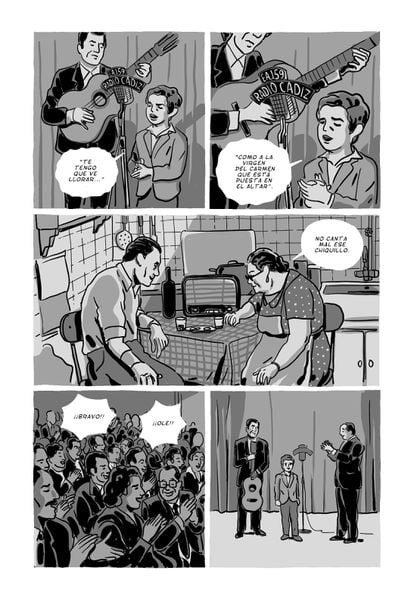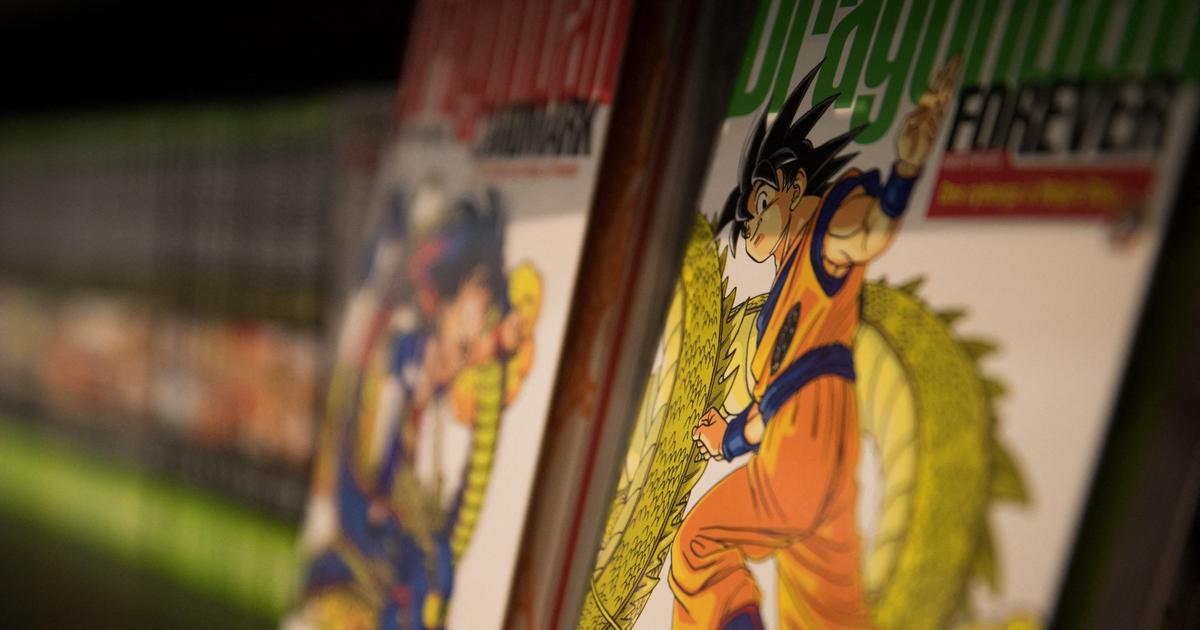On August 2, 30 years of the death of José Monje Cruz are commemorated in Badalona, a date marked by fire in the
shrimp
calendar .
Coinciding with this anniversary of the singer born in 1950 in the Cadiz town of San Fernando, the Desacorde publishing house publishes
Camarón, they say about me
, a graphic novel in the form of a biography illustrated by Raulowsky with a script by Carlos Reymán.
The work, as pointed out in the prologue Ricardo Pachón, producer of the mythical album
The legend of time
and a key figure in the
flamenco that was forged from the 1970s on, is a biography “pure and clear, worthy of Camarón”.
A book that sounds like an album and which also emanates something similar to the goblin, that enigmatic concept that has been in permanent discussion for a century.
Federico García Lorca defined it as a feeling that "communicates the essence of the world", something that this book can boast about because what its pages reflect through 10 chapters is the particular atmospheric universe of the most important cantaor in the modern history of the flamenco, from his birth to his death.
More information
Camarón narrates his legend in the first person
Regarding the greatness of Camarón, Antonio Benamargo, current artistic director of the Suma Flamenca Festival in Madrid, who treated him and presented him at a festival, points out: “Camarón is my favorite cantaor, the one of our generation. He spoke little, but it is something I say as a virtue, because he was also his way of being ”. Part of the legend was his way of being in the world, which added to his indisputable greatness in relation to music: “He had a prodigious tuning, I have never seen anything like it. He was a genius of cante who had a cry that implied you. You just have to listen to Camarón and enjoy it, ”Benamargo says. For Ricardo Pachón, Camarón is associated with freedom “because it is the essence of the gypsy people. And that freedom, that ability to do whatever he wanted and always feel free, is the example of his life. "Pachón adds that Camarón's memory is immortal thanks to the gypsy people: "Musically, it was exceptional, gypsy cante is unique and for them he was a god, a leader, with that magic in his voice."
Page from the graphic novel 'Camarón, they say about me'.
There are many books published on the life and trajectory of Camarón since his death on July 2, 1992. Recently, two graphic novels have been added to the library in the section of works dedicated to José Monje Cruz.
Shrimp
were published in 2020 .
Joy and sorrow,
by Irene Mala and Salva F. Romero, in Reservoir Books;
and
Shrimp.
The legend of the genius,
by Sete González, in editorial Lunwerg. On this occasion, the work of Raulowsky and Reymán, in black and white, recreates the artist's biography as a journey of open sensations, a different narrative with respect to the other two albums, where the weight of the story is built on more marked episodes of the cantaor. For Raulowsky, "each one adapts his vision of Camarón, there are many and that is good", and adds about the disparity of ways of portraying the cantaor that his was guided by the intention of "telling a very popular story and paying homage to the comic ”.
In that sense, the book is an adventure comic where the chapters are announced with the characteristic typography and tiles of the Cadiz street map. With the rhythm of the adventurous genre, a vital journey is recreated in a fabulous way that gravitated between the search for new sounds and the knowledge and respect for tradition. In
Camarón, they say about me
an important element is the hypnotic presence of the artist's parents, distributed throughout the story in different vignettes, with expressions of pride.
The father, who worked in the forge, died of an asthma attack when Camarón was very young;
and the mother, Juana, from a Canastera family, passed away in 1986. She was fundamental in the career and vital spirit of the cantaor: “I learned everything from my mother Juana”.
His last words before he died were for her.
For the cartoonist Raulowsky, "the image of the father and mother tries to tell where that sadness that Camarón is always perceived from comes from."
Another page of the comic.
Carlos Reymán and Raulowsky started the project five years ago, with music very present in the text and the drawing. “For the graphics, I thought about the imprint of flamenco, I looked for a very direct line, with a clear line and seeing from there what was coming out. I started by drawing unscripted scenes and then Carlos added a more defined structure. I have drawn a lot accompanied by his music, which has helped to give meaning to the drawing. Camarón had a very changing face, but there is a common element in how we have reflected it in all its stages: with a black tear, which is the cry of flamenco ”. A cry that caught them in the first person during the production time with the death of the artist's father and the death, once the book was finished, from Reymán after a year of illness. In closing the conversation, Raulowsky points out:“This comic has a lot of experiences, also personal, and one that underlies is that flamenco sorrow from our admiration for Camarón”.








/cloudfront-eu-central-1.images.arcpublishing.com/prisa/W24ZFWCMCFGMHPPJYFGV27BJJA.jpg)
/cloudfront-eu-central-1.images.arcpublishing.com/prisa/6YCPB3COKFHPZIDIWESDJRX7CE.jpg)